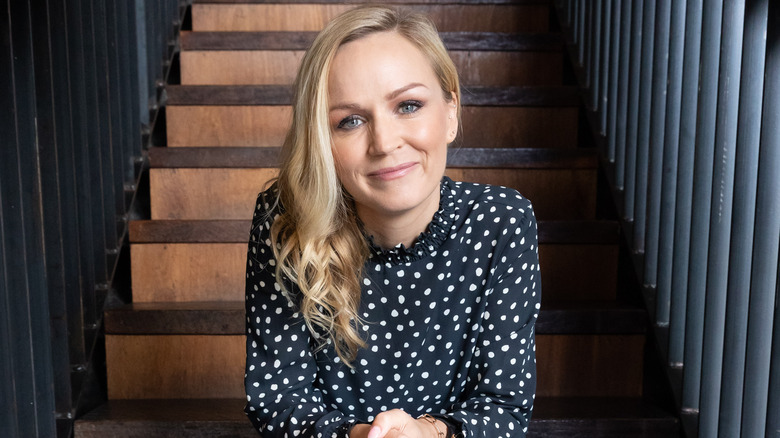Dr. Maike Neuhaus Shares The Real Secrets For Finding Happiness - Exclusive
Attempting to answer the question of what makes us happy can feel as daunting as determining the purpose of life. "Everyone wants to be happy. However, research shows that we're not very good at answering that question," says Dr. Maike Neuhaus in an exclusive interview with Health Digest. Dr. Maike Neuhaus, also known as The Flourishing Doc, is a positive psychology practitioner, trainer and coach, and self-leadership advocate. She thrives on spreading the science of happiness to help people create a life that excites them.
"From a young age, I had a fascination with the fact that some people seem to flourish, while others struggle from one hurdle to the next," says Dr. Neuhaus. "I always wondered what behavior, actions, thoughts or circumstances distinguished these two groups." She attributes it to a state of mind researchers refer to as "miswanting," or an inability to anticipate what we need in order to be happy. "In other words, we go about pursuing our own happiness in an intuitive way — we aim for goals that we assume will make us happy. However, when we achieve them, instead of feeling as ecstatic as we hoped we would, we're often left feeling deflated or indifferent — a typical anticlimax. Or, the happiness we perceive wanes as quickly as it came."
Dr. Neuhaus shares that our happiness is more within our control than we think. "While happiness looks slightly different to everyone, there are certain elements to a happy life every human has in common," she states.
Focus on 'flourishing' over being happy
The word "happiness" can encompass many meanings, but Dr. Neuhaus breaks it down to demonstrate just how nuanced happiness can be. "For example, happiness can describe that pleasant feeling of joy. However, emotions typically last [only] for a few seconds to minutes," she explains. "Happiness can also refer to something positive psychology researchers would refer to as 'subjective wellbeing' — this includes how often we feel positive emotions, how often we feel 'negative' emotions, and how satisfied we are with our life in general (i.e., a cognitive evaluation of our life)."
Rather than focus on happiness, Dr. Neuhaus suggests individuals reframe the concept to the idea of "flourishing." "Flourishing includes subjective wellbeing, plus social and psychological wellbeing: social wellbeing refers to having fulfilling social connections, as well as having a sense of belonging to [a] community," she explains. "Psychological wellbeing entails personal growth, accomplishment, living our purpose, mastering skills and having a sense of self-actualization." However, what falls into each of these three categories is not the same for everyone, Dr. Neuhaus notes. For this reason, she centers her work with clients around identifying what each of these areas means to them on a personal level.
Don't let cherophobia get in your way
While fear is an essential human emotion when it comes to safety and self-preservation, Dr. Neuhaus explains that it can hinder us on our path to flourishing in the form of cherophobia. Dr. Neuhaus notes that the condition is not currently recognized as a clinical diagnosis, but that symptoms can look similar to those of anxiety. "Signs that someone may have cherophobia include feeling anxious when thinking about attending a 'fun' social event, fearing that positive life changes may be followed by negative events, or feeling guilty about being happy (e.g., because other people around them may be unhappy) and therefore trying to avoid it," she explains.
In addition to being mindful of when signs of cherophobia may be surfacing, Dr. Neuhaus highlights what signs of "languishing" can look like. "We all have an innate need to flourish and feeling happy forms a crucial part of that," she states. "If those needs aren't met, we languish — which is a feeling of indifference, being completely bored in life, feeling 'meh' or living on autopilot." Dr. Neuhaus also points out how mental illness can influence these emotions. "We also know that absence of flourishing is related to mental illness, so the risks of having cherophobia without addressing it likely also include mental illnesses like anxiety or depression."
Do less of the things that make you miserable
If you've ever heard the phrase "less is more," Dr. Neuhaus demonstrates how this same principle can also apply to our emotional wellbeing. "I think sometimes, instead of hearing yet another thing we should add to our list, it's good to see that we could instead do less of something that is unhelpful," she says.
Dr. Neuhaus advises doing away with things that can give rise to unhappiness, including people, beliefs, or behaviors. Ignoring one's own feelings, trying to cope with alcohol, placing immense pressure on yourself, bottling up your emotions, spending more time indoors than outdoors, and aimlessly scrolling through social media can foster unhappiness, notes Dr. Neuhaus. She goes on to highlight additional factors that can contribute to feelings of unhappiness such as, "Paying attention to how other people would like you to live & pursuing that. Believing that you have to earn your worth and then surrounding yourself with people who confirm that. Putting everyone else before you. Not questioning your beliefs. Ever. Complaining about any aspects you don't like about your life, but not taking action yourself — especially not if it feels new & scary."
Teach yourself the tools that lead to flourishing
"Research shows that our happiness is determined by our genes, our life circumstances, and our actions," says Dr. Neuhaus. Even though our genes and circumstances may not be fully within our control, she emphasizes that we do have control over our actions. In other words, Dr. Neuhaus says that self-reflection is pivotal in figuring out how each of us can best flourish. "It's simple but not necessarily easy as it includes deep self-knowledge," she states. "This requires a lot of introspection and getting to know our strengths, talents, passions, values, etc. Thus, the answer is not written anywhere but lies within us. That's why getting help from a coach can be a fantastic tool to uncover this self-knowledge that is often buried somewhere in our minds."
Similar practices can be used to regulate our emotional state and evoke positive emotions, such as joy, Dr. Neuhaus explains. She discusses how this can be an especially powerful tool to combat negative states of mind. "Research shows that being in a positive emotional state makes us more creative, innovative, productive, [and] successful, and enables us to form better relationships with the people around us," Dr. Neuhaus states. "There are many simple yet effective practices we can learn to regulate our emotional state in a positive way, for example through savoring, mindfulness, or gratitude practices," Dr. Neuhaus continues.
Know that it's okay not to feel happy all the time
As much as we all want to feel joy, 24/7 round-the-clock happiness is not meant to be the ultimate goal. "It's so important to note that feeling happy all the time is not something anyone should strive for," Dr. Neuhaus says. "Experiencing negative emotions is a normal and necessary part of our life as they provide us with feedback that something is not right so that we can respond to it accordingly."
She goes on to explain how it is possible to have too much of a good thing. "In fact, always looking on the bright side of life or ignoring our negative feelings is referred to as toxic positivity," she explains. "We actually cannot be happy all the time as we literally get used to it to the point where we feel 'normal' again after a while. While we used to think that mental health is simply the absence of mental illness (like depression or anxiety), we now know that in order to be completely mentally healthy, we also need to be flourishing."
You can find out more about Dr. Maike Neuhaus by visiting: theflourishingdoc.com. Or connect with her on Instagram, Facebook, and LinkedIn.
If you or someone you know needs help with mental health, please contact the Crisis Text Line by texting HOME to 741741, call the National Alliance on Mental Illness helpline at 1-800-950-NAMI (6264), or visit the National Institute of Mental Health website.






